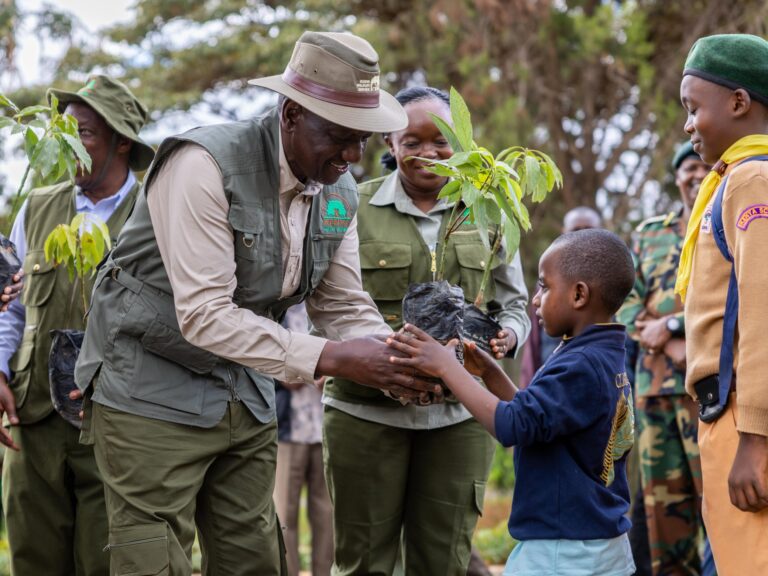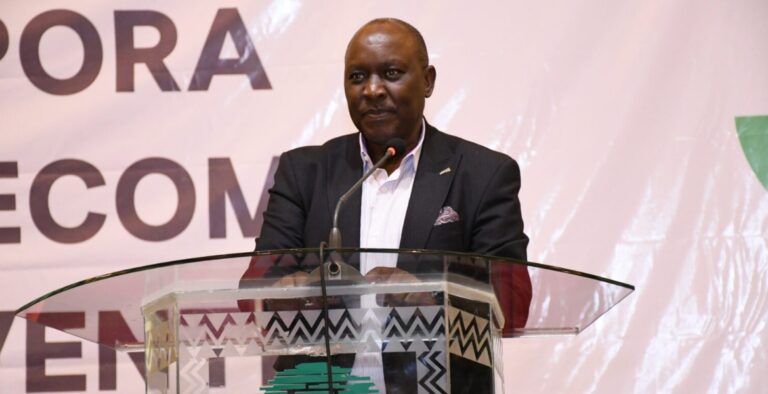
Former Kakamega Senator Cleophas Malala, writer of 'Echoes of War' addressing journalists on Wednesday night. Photo/Citizen Digital
Wanderi Kamau and Daisy Okiring
The Ministry of Education has accused former Kakamega Senator Cleophas Malala of “weaponising” students for political gain after a week-long storm over the controversial play Echoes of War by Butere Girls High School.
The play, which was scheduled to be performed at the 2025 Kenya Schools and Colleges National Drama and Film Festival, has triggered a national debate over free expression, student protection, and state censorship.
Play sparks drama beyond stage
The play Echoes of War, written by Malala, reportedly urges the Gen Z generation to resist oppression allegedly perpetrated through government policies. Although the play passed through initial sub-county and county levels without issue, it was significantly altered at the regional level to include more politically sensitive content—raising red flags among school administrators and festival officials.
According to the Ministry of Education, the school’s Board of Management chose to withdraw the play, citing a breach of Regulation 19.2 of the festival’s rules, which prohibits the presentation of unadjudicated or significantly altered scripts at higher competition levels.
Read more:Kakamega launches East Africa’s largest Bicycle Mobility Program
The school sent students home for April holidays, but two courts—one in Kakamega and another in Kisii—ordered that the play be reinstated for performance at the national level. In compliance, the Ministry instructed Butere Girls to return to Kirobon Girls, Nakuru, where the performance was scheduled for Thursday, April 10 at 8 a.m.
Students refuse to perform
Despite complying with the court order, the play was not performed as scheduled. The students refused to go on stage, citing police harassment and the absence of Mr Malala as the director. Reports indicate a heavy police presence at Kirobon Girls and interference that students claim left them intimidated and emotionally shaken.

Interior Cabinet Secretary Kipchumba Murkomen issued a public apology after 15 students from Butere Girls were reported missing during the chaotic return to Nakuru.
“I regret the incident involving the missing students. We are working with relevant agencies to ensure their safe return and investigate any misconduct that occurred during the Nakuru festival,” said Murkomen.
Malala denies incitement
Malala, the immediate former Secretary-General of the United Democratic Alliance (UDA), defended his script, stating it was neither inciteful nor intended to stir rebellion.
“The play speaks to the hopes and frustrations of young Kenyans. It’s artistic expression, not sedition,” said Malala.
His sentiments were echoed by the Orange Democratic Movement (ODM), which strongly condemned the state’s handling of the situation. ODM Secretary-General Edwin Sifuna, in a statement on April 10, accused the government of “overreacting to youthful creativity.”
Read more: Clashes erupt between Nigerian security forces and protesters
“The treatment of Butere Girls students and journalists by state agencies is disgraceful. Instead of nurturing talent, the government chose repression,” said Sifuna.
On Wednesday, journalists covering the festival chaos were attacked by police officers in Nakuru, further fuelling public outrage and questions over the state’s commitment to media freedom.
Ministry, TSC cite violation of regulations
The Ministry of Education, however, maintains that Malala violated multiple rules. According to the Kenya National Drama and Film Festival regulations, only teachers registered with the Teachers Service Commission (TSC) or certified lecturers can train students for such competitions. Section 9.0 of the festival rules explicitly bars non-teachers from directing school performances.
Furthermore, a 2018 TSC circular and the 2015 TSC Code of Conduct prohibit any unauthorized individuals from coaching or training students in co-curricular activities.
Read more:Wamuchomba summoned by police for alleged ‘incitement’
“The Ministry wishes to remind principals that involving non-teachers in training learners is a contravention of TSC regulations,” stated Education CS Julius Migos Ogamba. “We cannot allow people to weaponise school children against authority. Let political wars be fought by politicians outside of learning environments.”
National debate on artistic freedom
The Echoes of War saga has stirred a national conversation on the limits of creative expression in schools and the boundaries between political commentary and education. While the Ministry maintains it is protecting students from politicisation, critics argue that censorship and heavy-handed state action are damaging both student welfare and Kenya’s cultural space.
As the dust settles, one thing is clear: Echoes of War has become more than a school play—it is now a mirror reflecting the broader tensions between government control, youth expression, and the future of civic engagement in Kenya.




3 thoughts on “Echoes of War: Malala ‘weaponizing’ students for political gain”
Comments are closed.